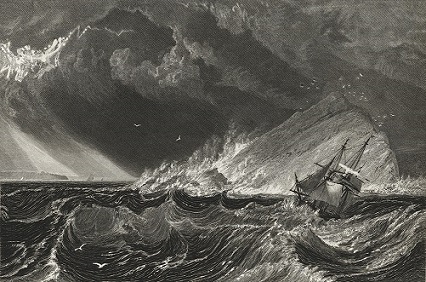
Turner piece courtesy of www.artsandcultureexeter.co.uk
Surrounded by books in a well-trafficked bookstore, I sat down to coffee with a former student. We’ve been meeting this way for many years. By now, he is in his early 70s while I am staring down at 87. Happily, we are both in robust health, and I always look forward to our conversations, particularly on that day as he’d recently returned from a year in Japan. As he related his experiences about life abroard, I noted he spoke in a booming voice as though his words needed to carry to the back of a large hall. As we were seated at a pedestal table no more than 3 feet apart, I took exception.
“Why are you yelling at me? I can hear you perfectly well.”
My companion paused, his features creased in a puzzled expression. “I’m sorry. I thought you might be hard of hearing.”
He was right in his assumption. I am hard of hearing which is why I wear earbuds that are as expensive as diamonds but without the glamor.
At 104, my mother could hear a fly drop on a marshmallow at twenty paces. Sadly, I follow in my father’s footsteps. His hearing loss began in his 50s. Even so, he refused to see a doctor and seemed to delight in forcing friends and family to shout at him. Rejecting his example, I take pity on those around me and wear my hearing aids when I’m in public. The doctor says I should wear them all the time, but they make my ears itch.
In any case, my point about the difference between my mother and father makes one thing clear. People don’t age in the same way. Hopefully, my mother’s genes will bestow a long and healthy life on me but science gives me no assurance. Genes, they say, have a 10-35% influence on longevity. The rest depends on diet and exercise.
Those born at the tag end of the Baby Boomers and the generations that followed probably see 80-somethings as prehistoric. Born before the advent of television, we are folks presumed to live in the shadows, figures bent like candy canes who shuffle about unobtrusively with the aid of wheelchairs, walkers, or canes. Would it surprise them to learn that Helen Mirren, age 78 and two years younger than President Joe Biden, made 5 films this year? (“Up/front Watch,” AARP, Aug/Sept. 2023, pg. 12.) Or, that in his two years in office, Biden has fulfilled so many campaign promises historians predict he will be remembered as one of the country’s ablest presidents?
Marjorie Taylor Greene, Georgia’s Republican member of Congress, disagrees with that assessment. She roots for Donald Trump, age 77, to win the 2024 Presidential election. Not only blind to Trump’s age, his previous presidential failures, and the many court indictments pending against him, she insists a higher power works in his favor. God has plans much bigger than this. (“They Said What?” FreeTought Today, September 2030, pg. 2) If the past is a prelude to the future, I shudder to think what these plans may be.
True, a significant swathe of the country shares Greene’s view. Like her, they don’t have the force of the pulpit behind them, but they claim to know God’s will and are determined by means fair or foul to convert the rest of us to their religiosity. They proselyte on social media, shout their hallelujahs over public school and prison speakers (Ibid pgs. 5-6), as well at sporting events–any place where they find a captive audience.
Nature thrives on diversity, but their God demands conformity. With each book banned from a school or library, these zealots celebrate– as if free will and free thought were worthy of a public hanging. By degrees, their successes rob the world of color. Once invention, imagination, and originality become exiles, we find ourselves confined to a grey pallet– a place of shadows where fear and hatred are free to spin their mischief.
The average lifespan for our species is 74 years. Measured in days, that represents 272,000 sunrises. Compare this number to the life of our sun which will burn another 4. 57 billion years. Given the contrast between it and ourselves, a question arises. Can we afford to be profligate with our brief hour upon the stage?
Whether young or old, rather than busying ourselves judging others, we’d do better to contemplate our common destiny and how our actions make either heaven or hell of the earth. The journey each of us takes may be private, yet we know it has public consequences. A good rule of thumb might be to consider looking inward and holding ourselves accountable for the good or ill we do. Only when we have shouldered that burden as a compass can we claim to be captains of our souls.
*Poem by William Ernest, Henley
